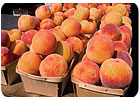
TUCSON, AZ (AP) - A University of Arizona professor has invented a sticker that can tell consumers if a fruit or vegetable is ripe. The stickers will be available to growers next year and should make their way to supermarkets within two to three years, said Mark Riley, a UA assistant professor of agricultural and biosystems engineering.
He said growers and grocers throw out thousands of bushels of fruit each year because it ripens faster than it can get to market or be sold.
With no simple way to tell whether fruit that looks good on the outside will taste good on the inside, consumers often buy peaches, pears and melons they can't eat because they're under-ripe or overripe.
"Right now, picking fruit is more of an art than it is a science,'' Riley said.
A marker on Riley's RediRipe stickers detects a chemical called ethylene gas, which is released by fruit or vegetables as they ripen. As that happens, the sticker turns from white to blue. The more ethylene gas the fruit produces, the darker the blue, Riley said.
The color shift is not instantaneous once a sticker is attached. It takes about 24-48 hours, depending on how fast the fruit is ripening, Riley said.
And there are still bugs to be worked out: The stickers do not change color to reflect an overripe or rotten piece of fruit. Also, not all fruit produces enough ethylene to be detected by the sticker, said Jim McFerson, manager of the Washington Tree Fruit Research Commission, a growers' research group that helped sponsor the research.
"There is still a lot of research to do,'' McFerson said.
Each sticker is expected to cost growers and grocers about a penny, Riley said.
The Arizona Board of Regents gave Riley permission to spend half his time in academia and half working on the sticker with his company, RediRipe LLC, which he co-owns with New Mexico entrepreneur Robert Klein.
There is a patent pending for the stickers through UA. Riley said when RediRipe goes to market, the university will keep the patent and the company will license the product.
Research on ethylene's use in fruit ripening began in the 1940s, and the gas is used to ripen fruits and vegetables in storage.
Mark Riley has done multiple small field tests on his stickers - including at an apple orchard in Willcox - and plans a much larger field test this fall in Washington.